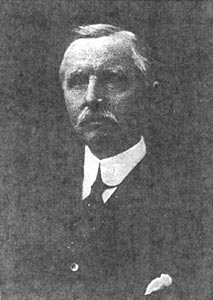[Trade Journal]
Publication: China, Glass & Lamps
Pittsburgh, PA, United States
vol. 33, no. 40, p. 8-9, col. 1-2
Death of James Pass
James Pass, one of the most prominent residents of Syracuse, N. Y., and widely known as pottery manufacturer and banker, died Nov. 1 at his home after an illness of only ten days. The funeral services were largely attended by friends of his home city and those from a distance.
Mr. Pass had not been in the best of health for a number of years, but with unfailing energy he continued to look after his extensive business interests until a short time ago when he contracted a severe cold. He had long been a sufferer from asthma, and this, complicated with the cold, so weakened him that although battling valienty [sic] valiantly until his last he was compelled to yield to the dread destroyer. He faced the end as he had faced every crisis in his long and useful career - with the fortitude of a Christian gentleman.
Born midst the potteries of the Staffordshire district in Burslem, England, on a bright June day in 1856, James Pass spent enough of his childhood in that busy region to be lastingly impressed. His father, Richard Pass, was a prosperous pottery manufacturer, and from earliest childhood James was in touch with the potteries. In 1863 Richard Pass sold out his interests and with his family removed to Cincinnati, where he remained until after the close of the civil war. He then moved to Trenton, where he became active in the pottery industry, and in 1875 made another change, this time going to Syracuse as superintendent of the Onondago Pottery Co. He continued with the company until his death in 1884, ever known as one who could be relied upon in every emergency to do his full duty.
Meantime James has been learning the things that American boys ought to know, and his education, largely acquired in the public schools of Trenton, was made the groundwork of those more extensive studies which in later years marked him as intellectually the most pleasant of companions. But the ways of those days were not the ways of our present advancement, and James, at the age of 13, was apprenticed to a potter who was instructed to make of him the best potter in Trenton. He worked under the superintendency of his father, and at the age of 18 had acquired a thorough knowledge of the trade with which he was always so closely connected. He moved with his family to Syracuse when he was 18 years old, and was immediately made foreman in the pottery which at time employed only 50 persons. Here he showed such aptitude that he was kept in that position until 1881 when he decided to try his fortunes in the west, which he did for three years, returning to Syracuse when his father died.
|
When he again entered the employ of the Onondago company it was in the capacity of general superintendent. In this position he had ample opportunity to show his real worth, and the splendid executive qualities which afterward showed him to be a born leader were so prominently displayed that in three years he was promoted to the position of general manager and given full charge of the company's rapidly growing business.
Later they made him vice president, then president, and the pottery grew in power and usefulness until it was soon employing 700 hands.
Mr. Pass was a man of original ideas. When he took charge, the pottery was making earthenware of the ordinary grade, but he knew there was a market for something better, and in a short time he had perfected and placed on the market the hotel china that made his name famous and has given to Syracuse the reputation for china which it now has. Mr. Pass had been preparing for this success for many years, his first work in the potteries having been supplemented by a thorough course in chemistry which he took in the Syracuse University. Then followed long and anxious experimentation, which, when he was called to the high place in the company's affairs, had reached a point where success was assured.
In 1890 Mr. Pass extended his pottery affairs, being associated with Mr. Seymour in the manufacture of electric porcelains for the use of the leading electrical manufacturing companies. For five years this business was carried on when Mr. Pass conceived the idea of putting electric porcelains of their own design on the market, and this too proved successful.
Through all these years of achievements James Pass was studying, adding to his store of knowledge and preparing himself for any place that the world might give him. And he was honored in many ways. The American Ceramic Society summoned him as one of its charter members and in 1896 and 1897 the United States Potters' Association made him its president. He was also director of the First National Bank of Syracuse and connected with many other enterprises where his sound business judgment and his eminent good sense aided materially in the success of every enterprise.

